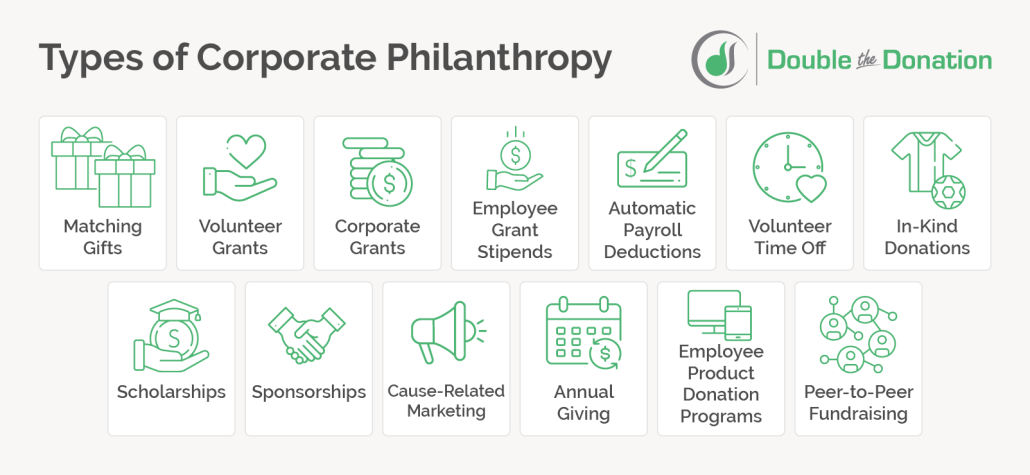Corporate philanthropy in action: real-world case studies that deliver results
Why Business Philanthropy Issues: An Overview to Corporate Social Obligation
Corporate philanthropy functions as a crucial element of company social obligation. It reflects a firm's commitment to social issues and enhances its public photo. Companies involving in philanthropic initiatives frequently see improved staff member morale and more powerful area ties. Nonetheless, the real effect of these campaigns can be multifaceted and intricate. Comprehending the nuances of company philanthropy can illuminate its importance in today's business landscape. What are the critical variables that drive its success?
The Interpretation of Corporate Philanthropy
Company philanthropy refers to the charitable contributions and efforts taken on by businesses to support social causes and area growth. This principle incorporates a variety of activities, including financial donations, employee volunteer programs, and in-kind gifts of service or products. Business participate in philanthropy to deal with social issues such as education and learning, health and wellness care, environmental sustainability, and destitution reduction.
Generally, business philanthropy is structured with formal programs or partnerships with nonprofit organizations, allowing businesses to leverage their resources efficiently. These initiatives often aim to make a favorable influence on the area while lining up with the business's values and mission. In addition, company philanthropy shows a commitment to corporate social duty, showcasing just how companies can contribute to society past revenue generation. By participating in humanitarian initiatives, companies can play a significant duty in cultivating social adjustment and resolving neighborhood needs.
Advantages of Business Philanthropy for Companies
Taking part in company philanthropy deals countless benefits for organizations, improving their reputation and promoting more powerful neighborhood connections. Business that proactively take part in kind initiatives often experience increased worker morale and commitment. When employees view their organization as socially accountable, they are more most likely to really feel happy of their workplace, leading to greater degrees of job complete satisfaction and retention.
Moreover, company philanthropy can produce useful networking opportunities. Collaborating with non-profits and neighborhood organizations enables companies to get in touch with similar individuals and groups, possibly bring about partnerships that can profit both parties. In addition, businesses participated in philanthropy may discover themselves more attractive to stakeholders and capitalists who prioritize moral practices.
Eventually, company philanthropy not only sustains social needs but additionally gives substantial advantages to services, developing a win-win circumstance that advertises development and sustainability while contributing positively to the world.
Enhancing Brand Commitment With Social Responsibility
Enhancing brand name commitment via social duty entails structure trust with customers by straightening company activities with community worths (corporate philanthropy). Firms can cultivate much deeper links via area engagement campaigns that reverberate with their target market. Furthermore, authentic brand narration can better enhance commitment by showcasing authentic dedication to social causes
Building Trust Fund Via Action
Structure depend on through action is an effective approach that firms can carry out to enhance brand name commitment and foster much deeper connections with customers. When organizations actively take part in corporate philanthropy, they demonstrate a commitment to ethical techniques and social duty. This positive strategy not just improves their track record but likewise reverberates with consumers that focus on worths positioning. Transparency in humanitarian efforts is essential; companies need to successfully communicate their initiatives and the effect they are making. Credibility plays a considerable function too; consumers are much more likely to sustain brands that genuinely respect social concerns instead than those that participate in surface advertising and marketing. Eventually, by prioritizing meaningful activities over mere words, business can support enduring trust fund and loyalty among their customer base.
Area Engagement Efforts

Genuine Brand Name Narration
Community engagement campaigns typically function as a structure for genuine brand storytelling, which plays a significant role in cultivating brand loyalty. By sharing authentic narratives regarding their social obligation initiatives, business can link mentally with consumers. These stories highlight the brand name's values, mission, and commitment to societal improvement, fostering count on and relatability. When customers regard a brand name as socially liable, they are extra most likely to establish a deeper fondness and choice for it. Genuine storytelling also encourages openness, welcoming customers to involve with the brand on a personal degree. Consequently, businesses not just boost their track record however likewise develop long lasting partnerships with their target market, ultimately leading to raised commitment and advocacy in an open market
The Role of Staff Members in Business Philanthropy
Employees play an essential duty fit a company's kind efforts with their interaction and participation. Reliable employee involvement approaches can improve volunteerism, resulting in purposeful neighborhood effect. As organizations harness the collective power and passion of their labor force, they can promote a culture of providing that prolongs past the work environment.
Staff Member Interaction Approaches
Interaction in company philanthropy promotes a feeling of objective that prolongs past mere profit-making. Business can boost employee participation by implementing different approaches that encourage engagement in philanthropic efforts. One reliable approach is to establish a matching present program, where the firm matches employee contributions to qualified charities, intensifying their impact. Furthermore, normal interaction concerning philanthropic efforts can produce recognition and motivate employees to contribute their time and resources. Furthermore, giving platforms for employees to share their philanthropic interests promotes a sense of possession and neighborhood. Identifying and awarding workers for their kind contributions can likewise reinforce a culture of providing, eventually leading to a much more engaged workforce lined up with the business's social responsibility goals.
Volunteerism and Community Impact
Corporate philanthropy thrives when individuals actively take part in volunteerism, directly affecting the areas they serve. Employee participation in volunteer campaigns not only improves business culture but also cultivates a feeling of function and connection among personnel. With volunteering, employees develop essential abilities, such as team effort and leadership, which can translate right into improved job performance. In addition, when staff members unify for area triggers, they strengthen their bond with the company, improving general spirits and commitment. Organizations that he has a good point urge volunteerism commonly see a positive public image, as area involvement reflects their dedication to social duty. Eventually, the cumulative effect of employee volunteer efforts can transform areas, resolving pressing social issues while enhancing corporate values and objective.

Gauging the Influence of CSR Initiatives
As organizations increasingly buy corporate social duty (CSR) efforts, understanding their influence comes to be vital for evaluating effectiveness and guiding future efforts. Gauging the effect of CSR requires a complex technique, integrating both measurable and qualitative metrics. Secret performance signs (KPIs) such as neighborhood engagement degrees, worker fulfillment, and environmental renovations offer beneficial understandings into the end results of CSR programs. Surveys and meetings with stakeholders can reveal the social change generated by these initiatives, while data analysis aids track progression versus established objectives.
Aligning CSR goals with organization objectives improves responsibility. Organizations can make use of frameworks such as the Worldwide Coverage Initiative or the UN Sustainable Advancement Goals to systematize their measurement processes. Inevitably, exact evaluation of CSR initiatives not just shows a company's commitment to social obligation yet likewise notifies approach adjustments to optimize positive effect, cultivating a society of sustainability and area engagement.
Ideal Practices for Implementing Effective CSR Techniques
Carrying out efficient CSR methods needs a clear understanding of an organization's goals and values, guaranteeing positioning with stakeholder expectations. Effective firms start by performing a thorough assessment of their social, ecological, and financial effects, enabling them to determine locations for improvement. Stakeholder engagement is important; organizations ought to proactively include workers, clients, and neighborhood members in the development and execution of CSR campaigns.
Openness is one more finest technique, as it cultivates depend on and responsibility. Business ought to communicate their CSR objectives and progression honestly, sharing both difficulties and successes. Furthermore, integrating CSR right into the core service technique enhances its influence, making it a basic element of operations as opposed to an afterthought. Regular evaluation and adjustment of CSR efforts, informed by stakeholder feedback and altering social needs, guarantee significance and efficacy. By sticking to these techniques, companies can create sustainable and significant CSR approaches that resonate with their communities.
Often Asked Concerns
How Can Small Companies Participate in Corporate Philanthropy?
Local business can get involved in corporate philanthropy by contributing a portion of earnings, funding regional occasions, partnering with nonprofits, offering worker volunteer days, and participating in social work tasks, cultivating a positive effect and boosting their brand credibility.
What Are Typical Mistaken Beliefs Concerning Business Philanthropy?
Typical false impressions concerning business philanthropy consist of the belief that it's solely a marketing device, that just huge companies can participate, and that it lacks authentic influence. Several ignore the value local business can add via purposeful involvement.
Just How Do Customers Perceive Companies Participated In Philanthropy?
Customers often view companies taken part in philanthropy positively, associating such efforts with company duty, moral actions, and area assistance. This understanding can boost brand name loyalty, influence buying decisions, and improve general corporate credibility in the market.
Exist Tax Advantages for Organizations Entailed in Philanthropy?
Businesses involved in philanthropy often enjoy numerous tax obligation advantages, such as deductions for charitable payments. corporate philanthropy. These rewards can improve a company's economic standing while advertising a positive public photo via their community engagement initiatives
Can Corporate Philanthropy Improve Worker Retention Rates?
Company philanthropy can enhance employee retention prices by promoting a sense of objective and belonging amongst team. Involved employees, straightened with business worths, are more probable to remain completely satisfied and fully commited within their functions.
Business philanthropy serves as a vital element of company social responsibility. Corporate philanthropy refers to the philanthropic payments and campaigns undertaken by services to sustain social causes read and area development. In addition, business philanthropy shows a commitment to company social obligation, showcasing just how companies can add to society past profit generation. Engaging in company philanthropy offers various benefits for companies, improving their reputation and promoting more powerful community ties. Customers often check out companies engaged in philanthropy positively, linking such initiatives with corporate obligation, honest actions, and community support.